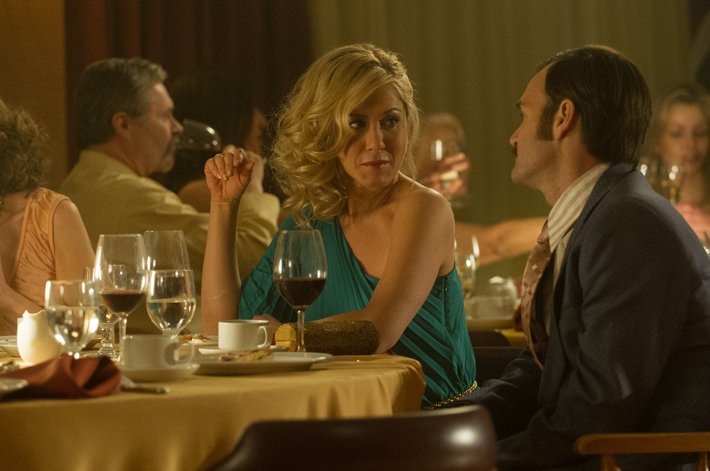 “The fifth commandment is ‘Thou Shalt Not Kill’ … But everybody kills.” Based on Agota Kristof’s trilogy of novels, twin brothers find themselves plunged into Hungary’s colossal defeat towards the end of World War Two. They are left struggling to come to terms with the inhumanity and violence inflicted upon both themselves and their homeland suffering during Nazi occupation and the subsequent Soviet ‘liberation’. The experience of war alters not only the paths their lives take but their behavioural and emotional capabilities. They are ruined. János Szász weaves together a film that never dares offer a nostalgic or euphemistic view of war – The Notebook is brutal, gritty and unflinching in its portrayal of human conditioning and the instinct for survival.
“The fifth commandment is ‘Thou Shalt Not Kill’ … But everybody kills.” Based on Agota Kristof’s trilogy of novels, twin brothers find themselves plunged into Hungary’s colossal defeat towards the end of World War Two. They are left struggling to come to terms with the inhumanity and violence inflicted upon both themselves and their homeland suffering during Nazi occupation and the subsequent Soviet ‘liberation’. The experience of war alters not only the paths their lives take but their behavioural and emotional capabilities. They are ruined. János Szász weaves together a film that never dares offer a nostalgic or euphemistic view of war – The Notebook is brutal, gritty and unflinching in its portrayal of human conditioning and the instinct for survival.
The nameless twin brothers (the wonderfully unnerving András and Lásló Gyémánt) are sent to live with their bad-tempered and mean-spirited grandmother (Piroska Molnár) on the Hungarian border because of their father’s inexplicable belief that twins are “too conspicuous” to live in a city during wartime. Beaten, verbally abused and made to do farm labour in exchange for meagre rations of food, the twins initially cannot understand their abandonment and long for a return to normality. They are faced with entirely irrational circumstances; they are forced to endure the cruelty of others and of war itself. The notable lack of names for any characters emphasises the faceless nature of the wide scale losses war brings. Szász daubs the film in a grimy palate of murky browns, rough beiges and muddy yellows. The landscape is harsh and unforgiving. The forest at the edge of the farm has a haunted look amongst its inky blue skies and spidery tree branches. A German camp spews angry grey smoke over the farm. There is no release; no end to their plight. This is no Hansel and Gretel fairytale – this is the stuff of nightmares.
The twins keep a diary of their experiences and told by their parents to survive the war “no matter what.” An instruction that haunts the pair, leading them down a dark and horrific course of events. They beat each other, swearing and cursing, in order to train themselves for the pain they will suffer at the hands of others. They burn the letters their mother sends them. They starve themselves. Slowly, they become hardened and desensitised to the world around them. As they see it, there is no room for sentiment and tears in war. Survival means a process of dehumanisation. 
As they embark upon their series of ‘training exercises’, they face an array of situations and treatment that no thirteen year old child should ever have to endure. A German SS officer and a Deacon have clear sexual intentions towards the boys. They are beaten savagely and mercilessly by the Hungarian police. They are sexually abused by the Deacon’s maid (Diána Kiss). In all of this, the only person to show the boys any compassion is a Jewish shoemaker who – upon seeing their dirty faces and ragged clothing – gives them winter boots for free. This same shoemaker is later turned in by the Deacon’s maid, who stands sneering and taunting at the Jews forced to march through the city to their death.
Examples of decency and tenderness are few. This callousness rubs off of the twins. They begin a collection of animals they have killed. They start by crushing beetles, then move to pinning down butterflies, pulling the legs from frogs, and finally plucking a live chicken before breaking its neck. Their behaviour is a highly visceral viewing experience. You hear the crunch of each beetle being pushed into their notebook; hear the feathers ripped from the squawking chicken before the final creak of its neck is wrung out before their silent, steely gaze. Their poor victims are then numbered, similar to the fate of those within the camps. Pieces of these creatures are then lined up within their notebook like a crude metaphor for the escalation of death within war.
As their behaviour deteriorates, the boys engage in a slightly unsettling exchange of glances, head tilts and eerie, unblinking stares straight down the lens. Almost indulging the notion of twin telepathy, they begin to act in sync as if one knows what the other is thinking. One is as vile as the other. Szász forces the viewer to wonder what happened to the little boys of the film’s opening: crying and longing for their mother. Their experience of war and lack of any appropriate adult attention has conditioned them into nasty and twisted versions of their former selves. And yet, they chose to be this way with their decision to train for survival. They are monsters in a nightmarish reality. András and Lásló Gyémánt give a performance well beyond their years. Any sympathy for them soon fades. They are relentlessly sinister in their acts of destruction; both of their own spirits and of others.
The Notebook is a peculiar and, at times, disturbing account of life on the losing side of World War Two. As a German ally, Hungary was fair game for the onslaught of Russians. With a large Jewish population, it was also a centre of genocide and brutality. Starvation, severe winters and bombings meant widespread suffering both during and after the war. How anyone processes the survival of such an experience is almost beyond comprehension. The imprint that it leaves on a young mind is a terrifying prospect. The twins at the heart of Szász’s film are irreversibly damaged by their desire to survive. There is no happy ending to their story.
- Sinners – Review - April 19, 2025
- Glasgow Film Festival celebrates its 21st edition with over 33,000 attendances - March 25, 2025
- The Return – Review from Glasgow Film Festival - March 9, 2025




